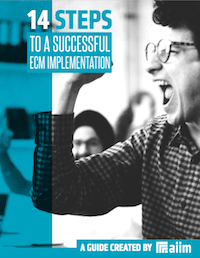The AIIM Blog
Keep your finger on the pulse of Intelligent Information Management with industry news, trends, and best practices.
Business Process Management (BPM) | Change Management
You have led the pack in creating a digital transformation strategy but how do you get your employees to engage and help your organization realize its goals? Embracing new technology is not the major challenge – human behavior is a significant factor in the success or failure of such projects. In this article, we look at five ways to change your employees behavior and drive digital transformation in your organization.
Share
Business Process Management (BPM)
In “The State of Intelligent Information Management: Getting Ahead of the Digital Transformation Curve,” AIIM made the case that every organization is on – or should be on! – a Digital Transformation journey. The heart of this Transformation journey is understanding, anticipating, and redefining internal and external customer experiences. AIIM believes that Digital Transformation effectiveness is imperiled by a rising tide of information chaos and confusion and that rising tide of information chaos and confusion is creating a demand for new information management practices that extend beyond traditional Enterprise Content Management.
Share

Making an ECM implementation successful requires planning and attention to detail. The best way to create the right solution is to identify organizational goals and priorities. Learn how to manage a successful implementation in our free guide.
Business Process Management (BPM)
In “The State of Intelligent Information Management: Getting Ahead of the Digital Transformation Curve,” AIIM made the case that every organization is on – or should be on! – a Digital Transformation journey. The heart of this Transformation journey is understanding, anticipating, and redefining internal and external customer experiences. AIIM believes that Digital Transformation effectiveness is imperiled by a rising tide of information chaos and confusion and that rising tide of information chaos and confusion is creating a demand for new information management practices that extend beyond traditional Enterprise Content Management.
Share
Business Process Management (BPM)
In “The State of Intelligent Information Management: Getting Ahead of the Digital Transformation Curve,” AIIM made the case that every organization is on – or should be on! – a Digital Transformation journey. The heart of this Transformation journey is understanding, anticipating, and redefining internal and external customer experiences. AIIM believes that Digital Transformation effectiveness is imperiled by a rising tide of information chaos and confusion and that rising tide of information chaos and confusion is creating a demand for new information management practices that extend beyond traditional Enterprise Content Management.
Share
Business Process Management (BPM)
When you’re working to document your processes, an initial goal is to map the workflow of the typical, standard task, getting the most common branches outlined. This will comprise of the steps you know well, the steps that already run fairly smoothly. Yes, this will not cover every scenario, but that’s ok at this stage.
Share
Business Process Management (BPM)
This is an overview of what is involved when it comes to documenting how to automate your processes. Of course, the devil’s in the details, and certainly, this is not the only way, but after listening to and learning from hundreds of our industry’s best consultants and analysts (the benefit of producing so many webinars – I listen to them all), I think this is one approach for you to consider.
Share